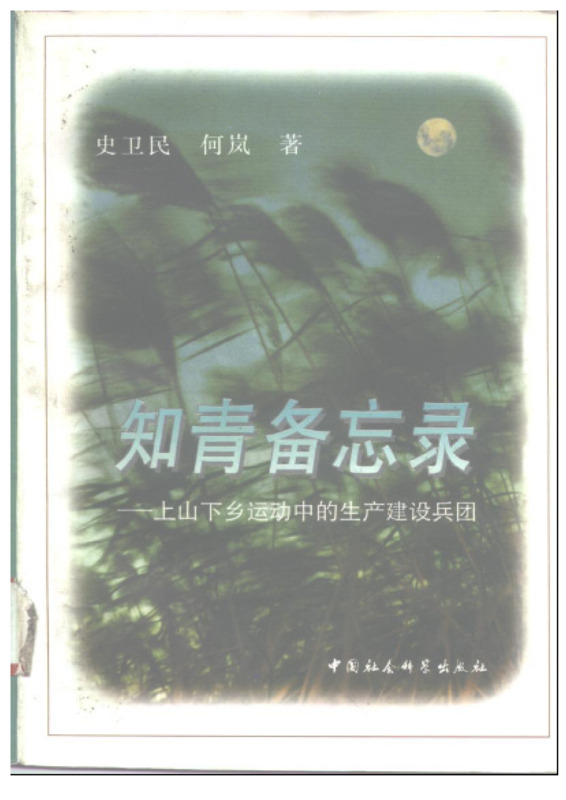Explore the collection
Showing 5 items in the collection
5 items
Book
Mao: The Unknown Story
This book presents the dramatic life of Mao Zedong, revealing a wealth of unheard-of facts: why Mao joined the Communist Party, how he came to sit at the top of the Chinese Communist Party, and how he seized China step by step. Writers Jung Chang and her husband Jon Halliday took ten years to complete this book, interviewing hundreds of Mao's relatives and friends, Chinese and foreign informants and witnesses who worked and interacted with Mao as well as dignitaries from various countries.
Purchase link:https://www.amazon.com/Mao-Story-Jung-Chang/dp/0679746323.
Book
Memo of the Educated Youth: Production and Construction Corps of the "Down to the Countryside" Movement
During the Cultural Revolution, 14.03 million urban junior and senior high school students said goodbye to their parents and families and left the cities to receive "re-education" in the "wide world." 10.48 million young intellectuals who had been sent to the army or returned to their hometowns were resettled in rural communities and squads. 1.26 million were placed in the newly-formed youth collectives and teams, while another 2.29 million were accepted by state-run farms and production and construction corps. The production and construction corps became the most concentrated place for intellectual youths, and had an undeniably important position in the whole movement of educated youths going to the countryside. This book describes the rise and fall of the production and construction corps and the fate of the educated youths who went to the countryside during the Cultural Revolution.
Book
Thirty Years of New China
Tang Degang is a historian and biographer who specializes in oral history. In the latter half of his life, he settled in the United States and taught at Columbia University and the City University of New York. In the field of history, he put forward the "Three Gorges Theory of History", which divides the change of Chinese social system into three major stages: feudalism, imperialism, and civil rule. The book was originally titled <i>Mao Zedong's Dictatorship, 1949~1976</i>, but was renamed <i>Thirty Years of New China </i> when it was released on the mainland.
Book
Who is the New China
Author Xin Hao Nian tries to analyze the modern history of China since the Xinhai Revolution. He pointsout that the People's Republic of China (PRC) is a restoration of the authoritarian system, and the Republic of China (ROC) represents China's road to a republic. The first volume of the book defends and clarifies the history of the Kuomintang (KMT), arguing that the KMT is not a "reactionary faction" as claimed by the CCP. The second volume criticizes the revolution and history of the CCP. The book was first printed in 1999 by Blue Sky Publishing House (USA) and reprinted in June 2012 by Hong Kong's Schaefer International Publishing. It is banned on the mainland.
图书
The Truth about Liu Wencai
In the mid-20th century, Liu Wencai, a large landowner in Sichuan Province, spent almost all of his family's wealth in his later years on promoting education, bridge construction and road building, and was known as a great benefactor in the region. However, during the Great Leap Forward and the Cultural Revolution, he was portrayed as an archetype of evil landlords in the 3,000-year history of feudalism in China.
As the controller of great wealth in southern Sichuan during the Republic of China period, Liu Wencai did accumulate a huge fortune from plunder in his early years, but in his later years he invested most of it in public welfare. He financed and presided over the construction of a highway, as well as the Wanchengyan irrigation system, benefiting hundreds of thousands of farmers. He also spent almost all of his family's wealth to found the Wencai Middle School (today's Anren Middle School), which at the time was known as Sichuan's best privately-run school. In the memories of the local people, Liu Wencai collected less land rent than what was collected by the government after 1949. He was praised for providing financial assistance to poor families during special days and festivals, and for mediating civil disputes in a fair manner.
These facts were erased under the ultra-leftist propaganda. The authorities even fabricated the story of Liu Wencai keeping farmers in a dungeon filled with water, as well as making sculptures depicting how Liu Wencai was exploiting farmers, in order to incite hatred against him. This made Liu Wencai one of the most famous evil landlords in China.




